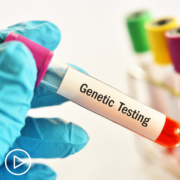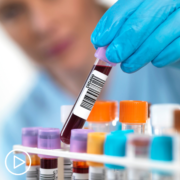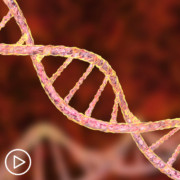Metastatic BC Research: How Can You Advocate for the Latest Treatment? from Patient Empowerment Network on Vimeo.
What do metastatic breast cancer patients need to know about the latest research news? Dr. Megan Kruse shares highlights from the 2020 San Antonio Breast Cancer Symposium (SABCS), along with her advice for advocating for the right testing to help guide treatment options.
Dr. Megan Kruse is a Breast Medical Oncologist at the Cleveland Clinic. More about this expert here.
See More From INSIST! Metastatic Breast Cancer
Related Resources:
Transcript:
Dr. Kruse:
At this year’s San Antonio Breast Cancer Symposium, there were a few interesting presentations about the treatment of first-line metastatic triple-negative breast cancer that I think patients should be aware of.
Two of the presentations centered around trials that were presented in the past. Those reporting, patients reported outcomes from the IMpassion 130 study, which looked at chemotherapy for metastatic triple-negative disease plus the immunotherapy atezolizumab. And then, there was also an update on the results from the KEYNOTE-355 study, which was a study again of chemotherapy for metastatic triple-negative patients in combination with pembrolizumab, a different immunotherapy. And both of these studies showed that there was benefit for women in certain sub-groups of triple-negative breast cancer when looking at addition of immunotherapy.
And so, what I’d like to draw patients’ attention to with these presentations is that you have to be aware of if you fall into one of these categories so you know if you’re a candidate for the particular type of immunotherapy that can be added to chemotherapy. There are two different ways to test for if a patient is a candidate for immunotherapy and they are both tests that can be done on biopsies of metastatic or cancer recurrent sites in the body.
They can also be sent off of original breast cancer tumors. And what we now know is that for patients who do not have markers that suggest immune activation or where the immune system would be responsive to immunotherapy the addition of that extra therapy really does not help to improve cancer control over chemotherapy alone. And I think that’s a really important topic because everyone is very interested in immunotherapy, but it does have side effects of its own and it can actually be lasting side effects in terms of inflammation in organs like the liver, the colon, and the lungs.
And then, the third presentation that I’d like to bring up is the IPATunity study, which looked at the addition of a targeted therapy called ipatasertib to, again, chemotherapy for the first treatment of metastatic triple-negative disease.
And so, this is getting into an area of targeted therapy for metastatic triple-negative disease. And again, only looks at patients that have a particular marker that suggests sensitivity to this drug. And those are certain genetic markers, predominately changes in a DNA marker called PIK3CA. In this study, we actually found that there was no benefit for the targeted therapy added to chemotherapy for patients that had that genetic mutation, which was different than what was seen in earlier studies of the same combination. So, I think there’s more work to be done and it’s probably too early to say that this targeted therapy will not be used in treatment of metastatic breast cancer.
But what all of these research studies show together is that metastatic triple-negative cancer is not really just one disease. It’s very clear that within that one name, there are multiple different patient types and tumor types that need to be cared for differently.
And so, again, I think the theme from these abstracts and these research presentations is that we have to look into the right therapy for the right patient at the right time, which largely involved DNA-based testing.
So, when patients are thinking about their treatment options and how to best help with their providers about what treatment options exist for them, I think it’s important to recognize the type of testing that may be advantageous in your cancer type.
And so, for all metastatic breast cancer patients, we really recommend that they’ve had genetic testing to look for DNA changes like BRCA mutations that will lead to treatment options. For metastatic triple-negative disease, it’s important to make sure that you’re providers are testing for PDL1, which would make you a candidate for immunotherapy. And then, the more we learn about clinical trials, the more we have options for patients that have had drug-based DNA or genome-based testing. So, that’s an important term for patients to become familiar with is genomic testing.
And I think when you bring that up with your providers, they’ll know what you’re talking about and they’ll know that what you’re potentially interested in is new targeted therapy for the cancer that may either come in combination with chemotherapy or as a standalone treatment option. If you don’t have those options that are available, and FDA approved basis for regular routine patient care, there is always the option of clinical trials.
And so, if that is something that you’re interested in, genomic testing will often open the way. So, I think as you’re writing notes when you’re talking to your providers, you might wanna jot down whether or not you’ve had genetic testing and whether or not you’ve had genomic testing in the past, as both of those things will help potentially address all of your treatment options.
I’ve very hopeful about the research that is going to lead to new developments for breast cancer treatment in the next few years.
I think what we’ve seen both at this San Antonio Breast Cancer Symposium as well as other conferences in the recent past has been a lot of focus on finding the right treatment for the right patient at the right time. And so, patients seem to be very interested in finding out this information. They often come to clinic armed with the most recent data, which allows their providers to have really informed discussions about what the best treatment might be. And to talk about if the new treatments are not great right now, what treatments might look like in the future.
I think the other thing that’s encouraging about the research that we’ve seen presented at this conference is that some of these trials are very, very large. For example, the RxPONDER trial was a trial of over 9,000 patients. And I really think that’s amazing to get that many patients interested in research that may not directly impact their patient care but will impact the care of others moving forward.
It’s just a sign that our breast cancer patients are empowered, and they want to make a difference in the scientific community as a whole.

















